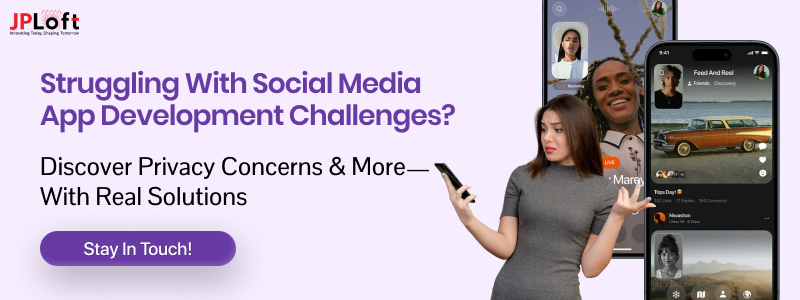Dreaming of creating the next Instagram or Facebook? Sounds exciting. But behind every scroll, like, and share, there’s a whole world of complex problems developers face.
In fact, social media app development challenges can impact the overall success of your app. From user privacy concerns to managing real-time data, the list of social media app challenges is longer than you’d expect. Can impact the overall success of your app.
Whether you're a startup or a seasoned tech team, understanding the challenges of social media apps is the first step toward creating a platform users will trust.
In this blog, we’ll break down the most common hurdles and how to overcome them smartly.
What is the Social Media App?
A social media app is a digital platform that allows people to connect, communicate, and share content with others.
Whether it's posting photos, sending messages, joining groups, or watching videos, these apps are built to keep users engaged and connected in real-time.
Best social media apps include Facebook, Instagram, Twitter, and TikTok and each of these apps has its own features, but the main goal is the same, bringing people together online.
For developers, creating a social media app means more than just adding a chat box or a feed. It involves designing smooth user experiences, ensuring privacy, and keeping everything fast and secure.
But before developing a social media app, it’s crucial to take a quick look at how big the market really is and why it’s full of opportunities.
Market Statistics of Social Media Apps
Social media apps have become a part of our daily lives, and their growth shows no signs of slowing down. With such rapid growth, social media app development trends and market statistics are shifting fast.
Here are some simple and eye-opening stats that show how big the market really is:
-
- According to Grand View Research, in 2022, the global social networking app market was worth around $ 49.09 billion, and it’s expected to grow at a fast rate of 26.2% every year from 2023 to 2030.
- A report by Research and Markets shows that the social media market is expected to grow quickly and reach $466.56 billion by 2029, with an annual growth rate of 13%.
- Social media apps are using AI to personalize content feeds, ads, and notifications. This helps keep users interested by showing them exactly what they want to see.
- A study by Vogue Business reveals that the creator economy is worth $500 billion and has over 50 million influencers worldwide. This highlights how important it is for social media apps to offer ways for creators to earn money.
- Data from AP News shows Meta Platforms, which owns Facebook and Instagram, earned $42.31 billion in the first quarter of 2025. This is a 16% increase in revenue, mostly from advertising.
These numbers highlight how exciting and competitive this space is. To succeed, developers must stay updated with trends and be ready to tackle social media app development challenges like performance, privacy, and innovation.
Major Challenges of Social Media App Development
If you want to create a social media app, plenty of hurdles can come along the way. So, keeping knowledge about all the challenges can help you throughout the development journey.
Here’s a breakdown of the top challenges of social media app development with practical solutions to overcome them.
1. User Privacy & Data Security
One of the largest challenges of social media apps online today is how apps treat user data. Social networks usually have to work with personal messages, photos, location information, and much more.
Mismanagement or leakage of this information can result in severe privacy concerns and loss of user trust. When users don't perceive that their privacy is being safeguarded, they jump ship at the first opportunity, sometimes forever.
During an era when data breaches are front-page news, solid privacy practices aren't nice to have; they're necessary for survival. Gaining and maintaining user trust is a long game that begins with secure development from day one.
How to Overcome:
-
- Use end-to-end encryption for private messages and sensitive data.
- Enable secure login methods like 2FA (two-factor authentication).
- Regularly conduct security audits and comply with privacy regulations like GDPR.
2. Designing a Seamless UI/UX
No matter how powerful your app is behind the scenes, if it doesn’t look and feel good, users won’t stick around. A confusing layout, a cluttered feed, or slow navigation can turn first-time users into lost opportunities.
Crafting an engaging, intuitive interface is one of the main social media app development challenges, especially when catering to different age groups and usage patterns.
Early stages like app wireframing and app prototyping play a key role in visualizing the user journey and refining the interface before development begins.
How to Overcome:
-
- Focus on a clean, user-friendly layout that prioritizes content.
- Conduct regular UX testing to understand user behavior and preferences.
- Optimize navigation flows for faster access to core features.
3. Cross-Platform Compatibility
Users want seamless access to social media apps across Android, iOS, web, and even smartwatches. Offering a consistent experience on all platforms is a top social media app development challenge.
Each platform has its own design guidelines, performance standards, and technical limitations, which make cross-platform development complex. For instance, React Native app development challenges often include handling platform-specific UI differences and native module integration.
Similarly, the Flutter app development process demands extra attention to maintain native performance and pixel-perfect design across devices. Ensuring smooth navigation and feature parity requires careful planning and ongoing optimization.
How to Overcome:
-
- Use frameworks like Flutter or React Native for cross-platform development.
- Make the UI responsive and test on various screen sizes.
- Optimize for performance across platforms.
4. App Scalability & Performance
As your user base grows, so does the pressure on your app’s backend systems. A slow-loading feed or a crashing app can drive users away quickly.
This is one of the main challenges of social media app development that many face as their app gains popularity.
Scalability isn't just about handling more users, it’s about delivering a seamless experience across devices and networks.
Poor scalability is one of the biggest social media app development challenges especially when traffic spikes unexpectedly.
How to Overcome:
-
- Use scalable cloud services like AWS or Google Cloud.
- Optimize your database queries and backend code.
- Run stress tests to prepare your app for traffic spikes.
5. User Engagement & Retention
Getting users to download your app is easy. Keeping them active is the hard part. Low engagement leads to high uninstall rates, making it one of the most common challenges while developing a social media app.
Users today have endless choices, so your app needs to offer something unique to keep them coming back. This is why creating a social media strategy for your eCommerce brand or any other community is crucial for building long-term value.
How to Overcome:
-
- Add interactive features like polls, reels, and stories.
- Use push notifications to bring users back to the app.
- Offer personalized content based on user behavior.
6. Development & Maintenance Costs
Developing and maintaining a full-fledged social media app requires serious investment. Between design, coding, testing, and support, the social media app development cost can be quite high.
Many startups underestimate the long-term expenses, including server costs, security updates, and feature upgrades. Without proper budgeting and planning, it's easy to run into financial roadblocks.
Also, investing in a reliable app maintenance services is crucial for your platform to stay secure, up-to-date, and ready to scale as user demands grow.
How to Overcome:
-
- Start with a Minimum Viable Product (MVP) to test the app.
- Use open-source tools and frameworks where possible.
- Plan a clear budget roadmap that includes both initial development and ongoing maintenance.
7. Real-Time Communication Features
Whether it’s chatting, calling, or live-streaming, users expect everything to work instantly. Building real-time functionality that’s fast and reliable is one of the biggest development challenges in social media apps.
Achieving this requires advanced tech stack like WebSockets and efficient backend architecture to ensure smooth, lag-free interactions. Any delay or glitch can quickly frustrate users and cause them to leave the app.
How to Overcome:
-
- Use WebSockets or Firebase for real-time updates.
- Ensure low-latency server communication.
- Collaborate with the best mobile app development company who specialize in real-time features.
8. Content Moderation
Unfiltered content can lead to misinformation, hate speech, or even illegal uploads. Failing to moderate effectively can cause legal issues and ruin brand reputation, a major challenge for social media apps worldwide.
As user-generated content continues to grow, so does the need for smart, scalable moderation systems. Relying only on manual review isn’t enough, automated tools and AI-driven filters are becoming essential.
Striking the right balance between freedom of expression and responsible content control is key to building a safe and trustworthy platform.
How to Overcome:
-
- Use AI tools to detect and filter harmful or inappropriate content.
- Build a reporting system for users to flag problematic posts.
- Employ human moderators for sensitive review tasks.
9. Third-Party Integration
Integrating with payment gateways, email services, or even other platforms like YouTube or Spotify is essential.
But poor integration can lead to app instability and security risks, a serious challenge while building a social media app.
Each third-party service comes with its own set of APIs, limitations, and update cycles, which can complicate development. A single failed integration can disrupt user experience and damage app reliability.
That’s why proper app testing, version control, and ongoing maintenance are critical when working with external tools.
How to Overcome:
-
- Choose trusted and well-documented APIs.
- Update integrations regularly to avoid compatibility issues.
- Test extensively before deployment.
10. Monetization Strategy
Not having a clear revenue model can derail even a well-designed app. Today, social media apps make money through creative approaches like in-app ads, paid features, and brand collaborations.
But choosing the wrong monetization strategy can frustrate users or limit growth. If it feels too pushy, users may uninstall the app. Balancing user experience with profitability is one of the key challenges of social media app development.
It makes monetization a tricky but crucial area for developers to get right.
How to Overcome:
-
- Introduce freemium models with premium upgrades.
- Integrate advertising in a non-intrusive way.
- Support creators with monetization tools to boost platform loyalty.
The list of social media app challenges is long, but not impossible to handle. The key is to identify the issues early, plan strategically, and work with the right team. Whether it’s privacy concerns, scalability issues, or monetization, every obstacle has a solution.
Build Your Dream App with JPLoft – The Trusted Experts
Developing a successful social platform demands a lot more than a fantastic idea, it needs a proven team. JPLoft has been a trusted social media app development company for a number of years. We have experience creating apps that are scalable, secure, and user-friendly.
Whether you are a startup or an enterprise, we help you navigate every aspect of the app development life cycle, from planning, prototyping, to launch, and post-launch support. We continue to stay on top of new tech trends, design practices, and the type of testing protocol necessary to deliver quality apps.
It makes the app not only easy on the eyes but also easy to use. By developing apps with us, you are not just hiring developers; you are partnering with experts who are vested in the success of your app.
Let's create something incredible together.
Final Wrap-Up
Building a successful social media app takes a great idea, strategic planning, the right tech choices, and the ability to solve real-world problems. From user privacy to performance and platform compatibility, the journey is full of challenges that need smart solutions.
But the good news is with the right strategy, skilled developers, and a clear roadmap, each challenge can turn into an opportunity for growth and innovation. Whether you're just starting or looking to scale your app, staying updated on trends and best practices is the key to success.
If you're ready to develop a social media app that stands out in this fast-growing market, partnering with the right team can make all the difference.
FAQs
The most common challenges include ensuring data privacy, building real-time features, creating an engaging UI/UX, handling scalability, and keeping users consistently engaged.
Real-time features like messaging, calling, and notifications require strong backend infrastructure, low-latency APIs, and expert developers who can implement fast and reliable performance across platforms.
User retention is tough because users quickly uninstall apps that don’t offer fresh content, smooth experience, or engaging features. Regular updates, gamification, and personalized content can help overcome this.
A cluttered or confusing design can push users away. Designing for multiple devices, user preferences, and age groups makes UI/UX a complex yet essential part of development.
Yes, it is. Each platform iOS, Android, web has unique design and performance standards. Ensuring consistent functionality and appearance across all platforms is a top challenge for developers.













Share this blog